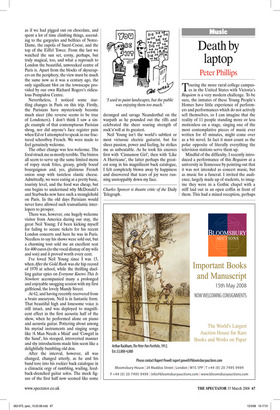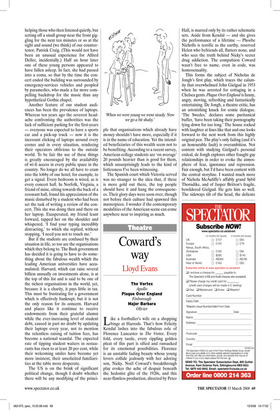Death by
laptop
Peter Phillips
Touring the more rural college campuses in the United States with Victoria’s Requiem is a very modern challenge. To be sure, the inmates of these Young People’s Homes have little experience of performers and performances which do not actively sell themselves, so I can imagine that the reality of 11 people standing more or less motionless on a stage, singing one of the most contemplative pieces of music ever written for 45 minutes, might come over as a bit novel. In fact it must count as the polar opposite of literally everything the television stations serve them up.
Mindful of the difficulty, I recently introduced a performance of this Requiem at a university in Tennessee by pointing out that it was not intended as concert music, but as music for a funeral. I invited the audience, largely made up of students, to imagine they were in a Gothic chapel with a stiff laid out in an open coffin in front of them. This had a mixed reception, perhaps helping those who then listened quietly, but setting off a small group near the front giggling for the next ten minutes or so at the sight and sound (we think) of our countertenor, Patrick Craig. (This would not have been an unusual experience for Alfred Deller, incidentally.) Half an hour later one of these young persons appeared to have fallen asleep. In fact, she had passed into a coma, so that by the time the concert ended the building was surrounded by emergency-services vehicles and peopled by paramedics, who made a far more compelling backdrop for the music than any hypothetical Gothic chapel.
Another feature of our student audiences has been the prevalence of laptops. Whereas ten years ago the severest headache confronting the authorities was the lack of sufficient parking for the first-years — everyone was expected to have a sports car and a pick-up truck — now it is the incessant clicking of laptops around every corner and in every situation, rendering their operators oblivious to the outside world. To be fair the use of these things is greatly encouraged by the availability of wi-fi access in every public space in the country. No longer do we all have to cram into the lobby of our hotel, for example, to get a signal. Every bedroom is wired, as is every concert hall. In Norfolk, Virginia, a friend of mine, sitting towards the back of a resonant hall, found his appreciation of the music disturbed by a student who had been set the task of writing a review of the concert. This she was doing then and there on her laptop. Exasperated, my friend leant forward, tapped her on the shoulder and whispered, ‘I find your typing incredibly distracting,’ to which she replied, without stopping, ‘I need you not to touch me.’ But if the students are confused by their situation in life, so too are the organisations which they belong to. The Bush government has decided it is going to have to do something about the fabulous wealth which the leading American universities have accumulated. Harvard, which can raise several billion annually on investments alone, is at the top of this list and is said to be one of the richest organisations in the world, yet, because it is a charity, it pays little in tax. This must be frustrating for a government which is effectively bankrupt, but it is not the only reason for its concern. Harvard and places like it continue to receive endowments from their grateful alumni while the ever-increasing level of student debt, caused in part no doubt by updating their laptops every year, not to mention the relentless raising of tuition fees, has become a national scandal. The expected rate of tipping student waiters in restaurants has risen to at least 20 per cent, while their welcoming smiles have become yet more insistent, their unsolicited familiarities at the table more desperate.
The US is on the brink of significant political change, though I doubt whether there will be any modifying of the princi ple that organisations which already have money shouldn’t have more, especially if it is in the name of education. Yet the intended beneficiaries of this wealth seem not to be benefiting. According to a recent survey, American college students are ‘on average’ 20 pounds heavier than is good for them, which unsurprisingly leads to the kind of listlessness I’ve been witnessing.
The Spanish court which Victoria served was no stranger to the idea that, if there is more gold out there, the top people should have it and hang the consequences. Their glory days were soon over, though not before their culture had spawned this masterpiece. I wonder if the contemporary modalities of the American scene can come anywhere near to inspiring as much.



























































































 Previous page
Previous page